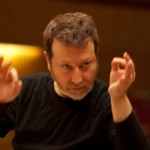By Rebecca Schmid
Berlin may be the capital residence for young composers today, and no other time of year makes this more apparent than the Ultraschall Festival for New Music. They gathered in strong numbers during freezing temperatures for a concert on January 19 at the Haus des Rundfunks, where Brad Lubman led the Deutsches Symphonie-Orchester in works by Johannes Maria Staud, Michael Jarell, Chaya Chernowin and Georg Friedrich Haas—only the last of whom was not present because he is moving to New York. The concert was moderated by Co-Intendant Magarete Zander, a broadcaster with Kulturradio RBB which co-hosts with the festival with the former West Berlin station Deutschlandradiokultur.
Staud, a young Austrian composer and former student of Jarell whose commissions include works for both the Berlin and Vienna Philharmonic, mentioned in onstage discussion how unusual it was to be programmed back-to-back with one’s teacher. His work Contrebande (On Comparative Meterology II), which premiered with the Cleveland Orchestra in 2010, reveals the influence of Jarell in its non-conformist language and ability to narrate through intricate orchestration. Staud takes the listener’s hand through this approximately 18-minute series of miniatures based on excerpts from a Der andere Herbst by the Polish-Jewish writer Bruno Schulz, exploiting the full orchestra with melodies that are tossed organically between sections and textures from piano clusters to hollow blows that do not exist for their own sake but to build an inner drama.
Jarell, when asked about mentoring his students, said that a composer has no choice but to be an honest with himself—a precept that is more obvious in theory than practice. The Swiss native’s Sillages—Congruences II for flute, oboe and clarinet and orchestra (2005), originally conceived for flutist Emmanuel Pahud, clarinettist Paul Meyer and oboist François Leleux, undertakes a sonic exploration of rippling water that draws inspiration from the artist Alberto Giacometti. With this in mind, the first section of the approximately 26-minute work moves mystically through space like the sculptor’s signature figures that stretch their bodies inexorably toward heaven. The trio, performed by ensemble recherche, twitters above an atmospheric orchestra, breaking still surfaces. The second part recalls Jarell’s Flute Concerto for Pahud in its frenzied dialogue, creating tremendous tension that is resolved in the leading winds.
Chernowin’s The Quiet (2010) similarly moves from whispering, creaking and muted percussion that evoke the beginning of a snowstorm until the bassoons and double bassoons break through the surface and usher in an ominous swarm of musical ideas—an avalanche turned upside down, in the composer’s words. The most haunting work of the evening was Haas’ …sodaß ich’s hernach mit einem Blick gleichsam wie ein schönes Bild…im Geist übersehe for chamber string ensemble (1990/91), inspired by a W.A. Mozart letter about the act of transforming an idea into a finished work. Fragments from the Sonata for Violin and Piano in B-Major (KV 454) emerge like ghosts out of an extended stretch of subdued squeals, pizzicato, and col legno strokes before receding again into emptiness. One could almost see the glow of the melodies as they unfurled—so fleeting that one could not catch them—before the strings resumed their relentless search.
Lubman, asked by Zander if one could find such a program in the U.S., could only laugh. “In the U.S.?” he asked rhetorically, explaining that smaller ensembles dominate the scene. A concert of purely contemporary orchestra music was a non-existent breed, he said, praising Germany for the value it places on culture. Of course, the history is not so simple. The Deutsches Symphonie-Orchester, founded in 1946 by Radio in the American Sector (RIAS), is one of several broadcast orchestras erected under American reconstruction after World War Two. The many composers who flock over the pond are, depending on one’s view, returning to their roots.
As it happens, Ultraschall’s official motto this year is to celebrate the exchange of ideas between France and Germany, once warring nations who signed the Elysée Treaty fifty years ago this month. The narrative of ‘internationality’ having come to dominate many artists’ identities, the theme can be stretched to showcase a wide range of composers—which is exactly what the festival does best. I just wonder how the Geneva-born Jarell fits into the spectrum of Franco-Allemand fraternity (Vive la Neutralité)…
Stay tuned for more on the Ultraschall Festival (January 17-27).
